|
Books Should Be Free Loyal Books Free Public Domain Audiobooks & eBook Downloads |
|
|
Books Should Be Free Loyal Books Free Public Domain Audiobooks & eBook Downloads |
|
Tragedies |
|---|
Book type:
Sort by:
View by:
|
By: Leo Tolstoy (1828-1910) | |
|---|---|
 Ivan the Fool
Ivan the Fool
Written after Tolstoy suffered a spiritual crisis, Ivan the Fool is a fairy tale that offers children instruction in how to live rightly, simply, and generously. The story emphasizes the destructive aspects of materialism and militarism while idealizing manual labor and the peasant life. (Introduction by Dorlene Kaplan) | |
By: William Shakespeare (1564-1616) | |
|---|---|
 King Lear
King Lear
Considered to be one of Shakespeare's greatest plays, the tragedy King Lear portrays some of the darkest aspects of human nature that can be found in literature. The helplessness of the human condition, as we fall prey to our destinies, the injustice and random cruelties practiced by people, suffering and humiliation, the lust for power and the greed for wealth are all depicted in this magnificent play. And through it all, runs the golden thread of love and sacrifice, daughterly affection and the true nature of our relationship with our parents... | |
 Othello
Othello
In seventeenth century Venice, a wealthy and debauched man discovers that the woman he is infatuated with is secretly married to a Moorish general in the Venetian army. He shares his grief and rage with a lowly ensign in the army who also has reason to hate the general for promoting a younger man above him. The villainous ensign now plots to destroy the noble general in a diabolical scheme of jealousy, paranoia and murder, set against the backdrop of the bloody Turkish-Venetian wars. This timeless tale, Othello The Moor of Venice was one of the ten famous tragedies that William Shakespeare wrote... | |
 King Richard II
King Richard II
The Tragedy of King Richard II, by William Shakespeare, is the first of the history series that continues with Parts 1 and 2 of King Henry IV and with The Life of King Henry V. At the beginning of the play, Richard II banishes his cousin Henry Bolingbroke from England. Bolingbroke later returns with an army and the support of some of the nobility, and he deposes Richard. Richard is separated from his beloved Queen, imprisoned, and later murdered. By the end of the play, Bolingbroke has been crowned King Henry IV... | |
 Richard III
Richard III
Richard III is an early history play probably written and performed around 1592-93. It is the culmination of Shakespeare's earlier three plays about Henry VI, and chronicles the bloody career of Richard, Duke of Gloucester. As the play opens, the Wars of the Roses are over, King Edward IV (Richard's brother) is on the throne, and all is ostensibly well. The problem? Richard wants to be king - and he'll stop at nothing to realize his ambition. | |
 The Winter's Tale
The Winter's Tale
Mad with jealousy, King Leontes of Sicilia orders his best friend Polixenes killed, his child abandoned, and his wife put on trial for adultery. Sixteen years later, Perdita, raised as a shepherd's daughter, falls in love with Polixenes's royal son and returns to her father's kingdom. | |
 Titus Andronicus
Titus Andronicus
Titus Andronicus may be Shakespeare's earliest tragedy; it is believed to have been written in the early 1590s. It depicts a Roman general who is engaged in a cycle of revenge with his enemy Tamora, the Queen of the Goths. The play is by far Shakespeare's bloodiest work. It lost popularity during the Victorian era because of its gore, and it has only recently seen its fortunes revive. | |
 King John
King John
The Life and Death of King John, a history play by William Shakespeare, dramatises the reign of John, King of England (ruled 1199–1216), son of Henry II of England and Eleanor of Aquitaine and father of Henry III of England. It is believed to have been written in the mid-1590s but was not published until it appeared in the First Folio in 1623. John (24 December 1166 – 19 October 1216), also known as John Lackland or Softsword, was King of England from 6 April 1199 until his death. His reign... | |
By: Oscar Wilde (1854-1900) | |
|---|---|
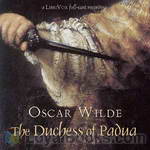 The Duchess of Padua
The Duchess of Padua
Guido Ferranti, a young man, travels to Padua with his friend Ascanio after receiving a mysterious letter from a stranger, claiming to know the true secret of Guido's birth. His plan of revenge goes awry, however, when he falls in love with his enemy's beautiful wife, the Duchess of Padua. | |
By: Joseph Conrad (1857-1924) | |
|---|---|
 Amy Foster
Amy Foster
Classic shortish story by Conrad that relates his self-thought alienation from British society, as a young foreign man survives a shipwreck off the coast of Kent, England only to be shunned by most of the townsfolk. The one exception is the loving, if dull-witted, Miss Foster. | |
By: Mary Wollstonecraft Shelley (1797-1851) | |
|---|---|
 Mathilda
Mathilda
The finished draft of a short novel by Mary Shelley. Its adult theme, concerning a father’s incestuous love for his daughter and its consequences, meant that the manuscript was suppressed by Shelley’s own father, and not published until 1959, more than a hundred years after her death. Summary by Cori Samuel | |
By: Wilkie Collins (1824-1889) | |
|---|---|
 The Dead Alive
The Dead Alive
Ill feelings exist between the Meadowcroft sons and John Jago, the foreman of the Meadowcroft estate. Then, John Jago disappears, and a body is found in a kiln. The Meadowcroft brothers stand accused of the crime, but are they guilty? The Dead Alive is a novel written by Wilkie Collins based on the true-life Boorn Brothers murder conviction case of 1819. Jesse and Stephen Boorn were sentenced to death for the murder of their brother-in-law, but were they wrongly convicted? | |
By: John Milton (1608-1674) | |
|---|---|
 Samson Agonistes
Samson Agonistes
“The Sun to me is darkAnd silent as the Moon,When she deserts the nightHid in her vacant interlunar cave.”Milton composes his last extended work as a tragedy according to the classical Unities of Time, Place and Action. Nevertheless it “never was intended for the stage” and is here declaimed by a single reader.Samson the blinded captive, in company with the Chorus of friends and countrymen, receives his visitors on their varying missions and through them his violent story is vividly recalled... | |
By: Johann Wolfgang von Goethe (1749-1832) | |
|---|---|
 The Sorrows of Young Werther
The Sorrows of Young Werther
The Sorrows of Young Werther (German, Die Leiden des jungen Werther, originally published as Die Leiden des jungen Werthers) is an epistolary and loosely autobiographical novel by Johann Wolfgang von Goethe, first published in 1774. The story follows the life and sorrows of Werther after he falls desperately in love with a young woman who is married to another. A climactic scene prominently features Goethe's own German translation of a portion of James Macpherson's Ossian cycle of poems, which had originally been presented as translations of ancient works, and was later found to have been written by Macpherson. (Introduction by Wikipedia and Barry Eads) | |
By: D. H. Lawrence (1885-1930) | |
|---|---|
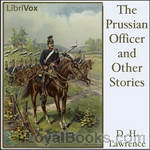 The Prussian Officer and Other Stories
The Prussian Officer and Other Stories
The collection of short stories – of which The Prussian Officer is one – was Lawrence’s first such book. A German officer and his orderly are the focus of the piece and, while socially the superior of his orderly, the officer demonstrates his is the distinctly baser character. (Introduction by Cathy Barratt) | |
By: John Galsworthy (1867-1933) | |
|---|---|
 Skin Game
Skin Game
A small play in three acts. A kind of comic tragedy. The plot tells the story of the interaction between two very different families in rural England just after the end of the First World War. Squire Hillcrist lives in the manor house where his family has lived for generations. He has a daughter, Jill, who is in her late teens; and a wife, Amy, as well as servants and retainers. He is "old money", although his finances are at a bit of low ebb. The other family is the "nouveau riche" Hornblowers,... | |
By: Aeschylus (c. 525/524-456/455 BC) | |
|---|---|
 Prometheus Bound (Browning Translation)
Prometheus Bound (Browning Translation)
Whether or not it was actually written by Aeschylus, as is much disputed, "Prometheus Bound" is a powerful statement on behalf of free humanity in the face of what often seem like the impersonal, implacable Forces that rule the Universe. As one of the most compelling rebel manifestos ever composed, it has appealed not only to the expected host of scholars of Greek drama, but also to a fascinatingly free-spirited array of translators, especially since the early 19th century; Percy Bysshe Shelley, Henry David Thoreau, and activist-poet Augusta Webster are among those who have tried their poetic and linguistic powers at rendering it into English... | |
By: Percy Bysshe Shelley (1792-1822) | |
|---|---|
 Zastrozzi, A Romance
Zastrozzi, A Romance
“Would Julia of Strobazzo’s heart was reeking on my dagger!”From the asthmatic urgency of its opening abduction scene to the Satanic defiance of the villain’s departure “with a wild convulsive laugh of exulting revenge”, this first of Shelley’s Gothic novelettes recycles much sensational boyhood reading and also points to some of his more mature concerns.It is the ego-driven pursuit of passionate extremes, revenge included, which consigns figures like Zastrozzi and the murderous Matilda to an isolation which is socially destructive as well as self-annihilating... | |
By: Charles Morris (1833-1922) | |
|---|---|
 The San Francisco Calamity by Earthquake and Fire
The San Francisco Calamity by Earthquake and Fire
The first half of this book describes the devastating earthquake that hit San Francisco in 1906, and the subsequent destruction caused by fire. Various eyewitnesses and victims give their account on the tragedy. In the second half, a number of different other earthquakes and volcanic eruptions are retold, like the eruption of the Vesuvius that destroyed Pompeij or the explosion of the Krakatoa, together with scientific explanations for the causes of earthquakes and the eruption of volcanos. | |
By: Henrik Ibsen | |
|---|---|
 A Doll's House
A Doll's House
Nineteenth century attitudes towards marriage, the role of women, morality and the search for identity are brilliantly explored in Henrik Ibsen's three act play, A Doll's House. It was highly controversial and received with a sense of outrage among opinion leaders in Europe. Many thinkers like August Strindberg lashed out at Ibsen for portraying the sacred institution of marriage in such a derogatory way. A Doll's House, written in the original Danish, was first performed at the Royal Theater in Copenhagen in 1879... | |
 The Master Builder
The Master Builder
Henrik Ibsen's The Master Builder, first published in 1892, is about architect Halvard Solness, who despite personal tragedy (including the death of his two sons) has risen to the top of his profession. He has succeeded partly through ruthless competition and exploitation and partly through a seeming ability to force his will on others. His unhappy wife Aline mourns for their lost life, and resents his interest in various young women, including his bookkeeper Kaia Fosli. Solness disregards the ambitions of other architects, including Knut Brovik and his son Ragnar, and seeks solace in the advice of family physician and friend Dr... | |
 Little Eyolf
Little Eyolf
Henrik Ibsen's 1894 play Little Eyolf tells the story of the Allmers family: the father, Alfred, his wife Rita, their crippled nine-year-old son Eyolf, and Alfred's sister Asta. As the play begins, Alfred has just gotten back from a trip to the mountains, and resolves to spend more time with his son, rather than on intellectual pursuits. Asta is romantically pursued by Borgheim, an engineer, while the cracks in Alfred and Rita's marriage gradually reveal themselves. The family receives a visit from the Rat-Wife, and are never the same again. | |
 When We Dead Awaken
When We Dead Awaken
When We Dead Awaken (1899) is the last play by Norwegian dramatist Henrik Ibsen. Dreamlike and highly symbolic, the play charts the dissolution of sculptor Arnold Rubek's marriage to Maia, her flirtation with Ulfheim, and his involvement with the mysterious Irene, his former model. The tensions rise between the characters as they climb higher and higher into the Norwegian mountains. | |
By: Émile Zola (1840-1902) | |
|---|---|
 L'Assommoir
L'Assommoir
Émile François Zola (French pronunciation: [emil zɔˈla]) (2 April 1840 – 29 September 1902) was an influential French writer, the most important exemplar of the literary school of naturalism. More than half of Zola’s novels were part of a set of twenty novels about a family under the Second Empire collectively known as Les Rougon-Macquart. L’Assommoir (1877) is the seventh novel in the series. Usually considered one of Zola’s masterpieces, the novel—a harsh and uncompromising study of alcoholism and poverty in the working-class districts of Paris—was a huge commercial success and established Zola’s fame and reputation throughout France and the world. | |
By: Friedrich Schiller (1759-1805) | |
|---|---|
 Mary Stuart
Mary Stuart
Schiller's tragedy depicts the final days of Mary, Queen of Scots, who has been imprisoned by her cousin, Queen Elizabeth I, because of her potential claim on the English throne. The action of the play revolves around an attempt to rescue Mary from prison and Elizabeth's indecision over whether or not to have her executed. The 1801 translation is by Joseph Mellish, a friend of Schiller's. | |
 Love and Intrigue
Love and Intrigue
Ferdinand is an army major and son of President von Walter, a high-ranking noble in a German duke's court, while Luise Miller is the daughter of a middle-class musician. The couple fall in love with each other, but both their fathers tell them to end their affair. The President instead wants to expand his own influence by marrying Ferdinand to Lady Milford, the duke's mistress, but Ferdinand rebels against his father's plan and tries to persuade Luise to elope with him. | |
By: Ann Radcliffe (1764-1823) | |
|---|---|
 A Sicilian Romance
A Sicilian Romance
A Sicilian Romance is a Gothic novel by Ann Radcliffe. It was her second published work, and was first published anonymously in 1790. The plot concerns the turbulent history of the fallen aristocrats of the house of Mazzini, on the northern shore of Sicily, as related by a tourist who becomes intrigued by the stories of a monk he meets in the ruins of their doomed castle. The introduction to the 'Worlds Classics' edition notes that in this novel "Ann Radcliffe began to forge the unique mixture of the psychology of terror and poetic description that would make her the great exemplar of the Gothic novel, and the idol of the Romantics"... | |
By: Sophocles (495-406 BC) | |
|---|---|
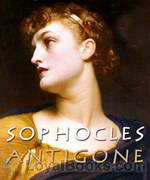 Antigone
Antigone
This is the final installment in Sophocles's Theban Plays, following Oedipus Rex and Oedipus at Colonus. Oedipus's daughter Antigone deliberately breaks the laws of Thebes when she buries her brother's body and is sentenced to death. She clashes with Creon, the King of Thebes, over what constitutes justice and morality: the laws of the state or the laws of the individual. | |
 Electra
Electra
Sophocles' play dramatizes the aftermath of Agamemnon's murder by his wife Clytemnestra and her lover Aegisthus. His daughter Electra is hungry for revenge and longs for the return of her brother Orestes to help her achieve her ends. | |
By: Christopher Marlowe (1564-1593) | |
|---|---|
 The Tragical History of Doctor Faustus
The Tragical History of Doctor Faustus
The Tragical History of Doctor Faustus, normally known simply as Doctor Faustus, is a play by Christopher Marlowe, based on the Faust story, in which a man sells his soul to the devil for power and knowledge. Doctor Faustus was first published in 1604, eleven years after Marlowe's death and at least twelve years after the first performance of the play. | |
 The Jew of Malta
The Jew of Malta
Christopher “Kit” Marlowe (baptised 26 February 1564 – 30 May 1593) was an English dramatist, poet, and translator of the Elizabethan era. The foremost Elizabethan tragedian before William Shakespeare, he is known for his magnificent blank verse, his overreaching protagonists, and his own untimely death. The Jew of Malta (1589) is an original story of religious conflict, intrigue, and revenge, set against a backdrop of the struggle for supremacy between Spain and the Ottoman Empire in the Mediterranean... | |
 Tamburlaine the Great
Tamburlaine the Great
Tamburlaine the Great is the name of a play in two parts by Christopher Marlowe. It is loosely based on the life of the Central Asian emperor, Timur 'the lame'. Written in 1587 or 1588, the play is a milestone in Elizabethan public drama; it marks a turning away from the clumsy language and loose plotting of the earlier Tudor dramatists, and a new interest in fresh and vivid language, memorable action, and intellectual complexity. Along with Thomas Kyd's The Spanish Tragedy, it may be considered the first popular success of London's public stage... | |
 Tragical History of Doctor Faustus (1616 version)
Tragical History of Doctor Faustus (1616 version)
The Tragicall History of the Life and Death of Doctor Faustus, commonly referred to simply as Doctor Faustus, is a play by Christopher Marlowe, based on the Faust story, in which a man sells his soul to the devil for power and knowledge. Doctor Faustus was first published in 1604, eleven years after Marlowe's death and at least twelve years after the first performance of the play. "No Elizabethan play outside the Shakespeare canon has raised more controversy than Doctor Faustus. There is no agreement concerning the nature of the text and the date of composition... | |
 Edward II
Edward II
Christopher Marlowe's Elizabethan tragedy focuses on the downfall of King Edward II, whose love for his favorite courtier, Piers Gaveston, leads to rebellion. | |
By: Lord George Gordon Byron (1788-1824) | |
|---|---|
 The Island
The Island
Written late in his career, Byron's narrative poem The Island tells the famous story of the mutiny on board the Bounty, and follows the mutineers as they flee to a South Sea island, "their guilt-won Paradise." | |
By: Anton Chekhov (1860-1904) | |
|---|---|
 Ivanov
Ivanov
Nicolai (anglicised Nicholas in this translation) Ivanov, a middle-aged public servant, is unhappy. His wife Anna, disinherited by her family after converting from Judaism, is dying of tuberculosis. He is deeply in debt. And his best friend’s daughter is infatuated with him. Comedy and tragedy ensue in truly Chekhovian fashion. An example of the young Chekhov’s maturing style, Ivanov is an early harbinger of themes that would recur throughout his work. | |
By: August Strindberg (1849-1912) | |
|---|---|
 Creditors
Creditors
Creditors is an 1889 tragicomedy by August Strindberg that plumbs the depths of the twisted triangular relationship between Tekla, her husband Adolph, and her ex-husband Gustav. | |
By: Aeschylus (525/524 BC - c. 455/456 BC) | |
|---|---|
 The Oresteia
The Oresteia
The Oresteia is a trilogy by Aeschylus, one of the foremost playwrights of ancient Greece. It encompasses three plays: Agamemnon, The Libation Bearers, and The Furies. It tells the tragic tale of the House of Atreus, whose inhabitants have been cursed and are doomed to play out their bloody, vengeful destinies. At the beginning of the first part, the Trojan War has ended and the Greek general, Agamemnon, is returning victorious to his wife Clytemnestra. Yet she finds it difficult to forgive his sacrifice of their daughter, Iphigenia, who was killed to ensure the Greek fleet fair winds in their voyage to Troy... | |
By: Morgan Robertson | |
|---|---|
 Futility, Or the Wreck of the Titan
Futility, Or the Wreck of the Titan
This novel was published a full 14 years before the sinking of the Titanic, but listeners may be surprised at how many parallels this fictional tale has with subsequent true events. The Titan is the largest and most technologically advanced steamship of her time. She is considered unsinkable. Her full speed crossings of the Northern Lane Route carry her rich passengers in the highest standards of luxury and comfort. The less well-off travel in rougher quarters but still benefit from the speed of travel... | |
By: John Webster (c.1580 - c.1634) | |
|---|---|
 The Duchess of Malfi
The Duchess of Malfi
John Webster's bloody Jacobean tragedy exposes the decadence of the Italian court. The virtuous Duchess of Malfi, a young widow, secretly marries her steward Antonio, and is subsequently persecuted by her brothers: the sexually obsessed and eventually mad Ferdinand, and the corrupt Cardinal. | |
By: Euripides (480-406 BC) | |
|---|---|
 The Bacchae
The Bacchae
This tragedy is based on the mythological story of King Pentheus of Thebes and his mother Agave, and their punishment by the god Dionysus (who is Pentheus' cousin) for refusing to worship him. | |
 The Trojan Women
The Trojan Women
Euripides' play follows the fates of the women of Troy after their city has been sacked, their husbands killed, and as their remaining families are about to be taken away as slaves. However, it begins first with the gods Athena and Poseidon discussing ways to punish the Greek armies because they condoned Ajax the Lesser for dragging Cassandra away from Athena's temple. What follows shows how much the Trojan women have suffered as their grief is compounded when the Greeks dole out additional deaths and divide their shares of women. | |
By: Francis Brett Young (1884-1954) | |
|---|---|
 The Tragic Bride
The Tragic Bride
The story centers on Gabrielle Hewish, only and lonely child of Sir Jocelyn Hewish, a loveable lush and owner of the peaceful Roscarna estate nestled in the Irish countryside. In due course, young Gabrielle falls in love with a Navy man whose untimely demise sends her into a depression, and the consequences of which alter her future, culminating in a fascinating and quite unpredictable relationship with Mrs. Payne and her troubled son Arthur. A story of understanding in it’s finest sense and aptly titled, The Tragic Bride is both interesting as a story and telling as a character study. | |
By: Ford Madox Ford (1873-1939) | |
|---|---|
 The Good Soldier
The Good Soldier
The Good Soldier (1915) "... is set just before World War I and chronicles the tragedies of the lives of two seemingly perfect couples. The novel is told using a series of flashbacks in non-chronological order, a literary technique pioneered by Ford. It also makes use of the device of the unreliable narrator, as the main character gradually reveals a version of events that is quite different from what the introduction leads you to believe. The novel was loosely based on two incidents of adultery and on Ford's messy personal life.”Music in sections 1-5 "Minuet in G flat major and Valse Bluette" by Beethoven | |
By: Frank Norris (1870-1902) | |
|---|---|
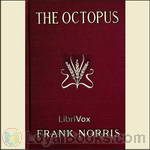 The Octopus
The Octopus
Frank Norris based his 1901 novel The Octopus (A Story of California) on the Mussel Slough Tragedy of 1880, a bloody conflict between ranchers and agents of the Southern Pacific Railroad. The central issue was over the ownership of the ranches, which the farmers had leased from the railroad nearly ten years earlier with intentions of eventually purchasing the land. Although originally priced at $2.50 to $5 per acre, the railroad eventually opened the land for sale at prices adjusted for land improvements; the railroad’s attempts to take possession of the land led the ranchers to defend themselves as depicted in the book. | |
By: Rita (E. M. Gollan) (1850-1938) | |
|---|---|
 The Mystery of a Turkish Bath
The Mystery of a Turkish Bath
A group of guests, at an exclusive luxury hotel in Hampshire, are the witnesses of an illustration of occult powers, demonstrated by “the Mystery”, as Mrs. Jefferson named the beautiful stranger who one day appeared in the Turkish Baths of the hotel. The events that follow lead Mrs. Jefferson to question the wisdom of her interest in the occult. | |
By: Lagerlöf, Selma (1858-1940) | |
|---|---|
 The Treasure
The Treasure
Selma Lagerlöf was born in Vaermland, Sweden, in 1858 and enjoyed a long and very successful career as a writer, receiving the Nobel-Prize in Literature in 1909. She died in Vaermland in 1940. The Treasure (Herr Arnes penningar) is a fairly short Novel, both a Drama and a Ghost Story. Published in 1904 and the English translation in 1923. The story is set in Bohuslaen on the West coast of Sweden in the middle of the 16th Century. Herr Arne, the old Parson in Solberga and all his household are brutally murdered, and his great Treasure stolen... | |
By: Romain Rolland (1866-1944) | |
|---|---|
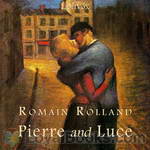 Pierre and Luce
Pierre and Luce
Pierre and Luce were an unlikely young pair who found themselves in the chaos of Paris during the war; Pierre, the shy, recently conscripted pacifist, and Luce, the free spirited artist in training, and both confused about the things going on around them. Why were these war birds flying overhead? Why these warning sirens, and occasional bombs exploding in the distance? Why did the government leaders, who didn't even know one another, hate and destroy so much? Why did these two delicate young adults find each other now? This story takes place between January 30 and Good Friday, May 29, 1918. (Introduction by Roger Melin) | |
By: Jean Racine (1639-1699) | |
|---|---|
 Phaedra
Phaedra
In the court of Louis XIV, adaptations of Greek tragedies were very popular. This play, heavily influenced by Euripides' Hippolytus, deals with love that violates social taboos. Note: In Racine's work, a new "scene" begins whenever a character enters or exits. Therefore, there are no stage directions, only a list of the characters on stage for each scene. The action is continuous for the entire act. | |
By: Johanna Brandt (1876-1964) | |
|---|---|
 The Petticoat Commando
The Petticoat Commando
In introducing the English version of this book I venture to bespeak a welcome for it, not only for the light which it throws on some little-known incidents of the South African war, but also because of the keen personal interest of the events recorded. It is more than a history. It is a dramatic picture of the hopes and fears, the devotion and bitterness with which some patriotic women in Pretoria watched and, as far as they could, took part in the war which was slowly drawing to its conclusion on the veld outside... | |
By: Francis Beaumont (1584-1616) | |
|---|---|
 The Maid's Tragedy
The Maid's Tragedy
Beaumont and Fletcher's The Maid's Tragedy (first published 1619) is a sensational Jacobean sex tragedy. When gentleman soldier Melantius returns to Rhodes, he finds his dear friend Amintor is recently married - but not to his troth-plight love Aspatia (the maid of the title). Instead, the King has arranged a match between Amintor and Melantius' sister, the beautiful Evadne. On his wedding night, Amintor finds that his new wife has married him under false pretenses - and this unleashes a torrent of dire consequences, sexual, emotional, and ultimately political. | |
By: Unknown | |
|---|---|
 One-Act Play Collection
One-Act Play Collection
One-Act Play Collection includes 6 one-act plays in the public domain. | |
By: William Shakespeare (1564-1616) | |
|---|---|
 Coriolanus
Coriolanus
Shakespeare was passionately interested in the history of Rome, as is evident from plays like Titus Andronicus, Julius Caesar, and Antony and Cleopatra. His tragedy Coriolanus was probably written around 1605-07, and dramatizes the rise and fall of a great Roman general, Caius Martius (later surnamed Coriolanus because of his military victory at Corioli). This play is unusual in that it provides a strong voice for the ordinary citizens of Rome, who begin the play rioting about the high price of food, and who continually clash with Coriolanus because of his contempt for plebians. | |
By: Euripides (480-406 BC) | |
|---|---|
 Medea
Medea
Euripides' tragedy focuses on the disintegration of the relationship between Jason, the hero who captured the Golden Fleece, and Medea, the sorceress who returned with him to Corinth and had two sons with him. As the play opens, Jason plans to marry the daughter of King Creon, and the lovesick Medea plots how to take her revenge. | |
By: William Shakespeare (1564-1616) | |
|---|---|
 Venus and Adonis
Venus and Adonis
Venus and Adonis is Shakespeare's narrative poem about the love of the goddess Venus for the mortal youth Adonis, dedicated partly to his patron, the Earl of Southampton (thought by some to be the beautiful youth to which many of the Sonnets are addressed). The poem recounts Venus' attempts to woo Adonis, their passionate coupling, and Adonis' rejection of the goddess, to which she responds with jealousy, with tragic results. This recording features three different readers performing the narration, Venus, and Adonis. | |
By: John Webster (1580-1634) | |
|---|---|
 The White Devil
The White Devil
John Webster's The White Devil (1612) is a Jacobean revenge tragedy, replete with adultery, murder, ghosts, and violence. The Duke of Brachiano and Vittoria Corombona decide to kill their spouses, Isabella and Camillo, in order to be together, aided by the crafty and ambitious Flamineo, Vittoria's brother. Their actions prompt vows of revenge from Isabella's brother Francisco, the Duke of Florence, and Count Lodovico, who was secretly in love with her. The title refers to the early modern proverb that "the white devil is worse than the black," indicating the hypocrisy practiced by many of the characters in the play. | |
By: Louis Ulbach (1822-1889) | |
|---|---|
 The Steel Hammer
The Steel Hammer
A large inheritance greatly transforms the lives of three people: a good man, who would have inherited at least a part of the fortune if his uncle hadn't passed away before he could alter the will, his cousin, who inherits all but is prevented from enjoying it, and a gambler, who is in desperate need of such a sum of money. The connection of the three ends fatal for at least one of them. | |
By: Henrik Ibsen (1828-1906) | |
|---|---|
 Rosmersholm
Rosmersholm
Rosmersholm is a play written in 1886 by Norwegian playwright Henrik Ibsen. In the estimation of many critics the piece is Ibsen’s masterwork, only equalled by The Wild Duck of 1884. As expressed by the protagonist, Rosmer, the theme of the play is social and political change, in which the traditional ruling classes relinquish their right to impose their ideals on the rest of society, but the action is entirely personal, resting on the conduct of the immoral, or amoral, “free thinking” heroine, Rebecca, who sets herself to undermine Rosmer’s religious and political beliefs because of his influential position in the community... | |
By: Thomas Middleton (1580-1627) | |
|---|---|
 Women Beware Women
Women Beware Women
Thomas Middleton's masterful 17th century tragedy is packed with adultery, incest, intrigue, revenge, and inventive methods for murder. Leantio elopes with Bianca against her family's wishes and tries to hide her in the house he shares with his widowed mother. Yet the Duke sees Bianca at the window and is powerfully attracted to her, threatening Leantio's security. Livia, a wealthy widow, delights in intrigue, aiding the Duke to satisfy his desires with Bianca, and bringing together her brother Hippolito with her niece Isabella, despite their familial relationship... | |
By: Aeschylus (c. 525 BCE - c. 456 BCE) | |
|---|---|
 Seven Against Thebes
Seven Against Thebes
In this, the only extant tragedy from Aeschylus' trilogy about the House of Oedipus, Thebes is under siege from Polynices, a former prince of Thebes. After King Oedipus left his city and cursed the princes, Polynices and his brother, Eteocles, decided to rule alternately, switching at the end of every year. However, at the end of his year as king, Eteocles refused to turn power over to his brother and exiled him, fulfilling his father's curse that the two brothers could not rule peacefully. In the action of the play, Polynices and a group of Argive soldiers are attacking Thebes so that he can take his place as ruler... | |
By: Euripides (484 BC - 406 BC) | |
|---|---|
 Orestes
Orestes
In accordance with the advice of the god Apollo, Orestes has killed his mother Clytemnestra to avenge the death of his father Agamemnon at her hands. Despite Apollo’s earlier prophecy, Orestes finds himself tormented by Erinyes or Furies to the blood guilt stemming from his matricide. The only person capable of calming Orestes down from his madness is his sister Electra. To complicate matters further, a leading political faction of Argos wants to put Orestes to death for the murder. Orestes’ only hope to save his life lies in his uncle Menelaus, who has returned with Helen after spending ten years in Troy and several more years amassing wealth in Egypt... | |
By: Louis Ulbach (1822-1889) | |
|---|---|
 For Fifteen Years
For Fifteen Years
For Fifteen Years by Louis Ulbach is the sequel to The Steel Hammer which tells the story of a poor upholsterer, Jean Mortier who is falsely accused of murder and the tragic chain of events that follow. For Fifteen Years begins in the aftermath of the conviction when the destitute wife and daughter of Jean Mortier are taken in by the family of a character witness from the trial, Gaston de Monterey. Circumstances and deceptions lead to distrust and tension among the two families for fifteen years but the daughter of Jean Mortier and the son of Gaston de Monterey have fallen in love... | |
By: William Shakespeare (1554-1616) | |
|---|---|
 Two Noble Kinsmen
Two Noble Kinsmen
The Two Noble Kinsmen is a Jacobean tragicomedy co-written by William Shakespeare and John Fletcher, first published in 1634. Set in ancient Greece during a war between Athens and Thebes, the narrative follows the title characters, Palamon and Arcite, noble youths whose friendship is destroyed by their mutual love for the beautiful Emilia. The subplot deals with the love and eventual madness of the Gaoler's Daughter, who falls hopelessly in love with Palamon. The play is based on "The Knight's Tale" by Chaucer, but also has echoes of Shakespeare's A Midsummer Night's Dream, as two of the major characters are Theseus and Hippolyta, who also appear in the earlier play. | |
By: Euripides (484 BC - 406 BC) | |
|---|---|
 Iphigenia in Tauris (Murray Translation)
Iphigenia in Tauris (Murray Translation)
The apparent sacrifice of Iphigenia at Aulis by her own father Agamemnon was forestalled by the godness Artemis, who by an adroit sleight of hand that fooled all participants, substituted a deer for the daughter. Wafted magically away to the “Friendless Shores” of savage Tauris and installed as chief priestess presiding over the human sacrifice of all luckless foreigners, Iphigenia broods over her “murder” by her parents and longs for some Greeks to be shipwrecked on her shores so she can wreak a vicarious vengeance on them... | |
 Alcestis
Alcestis
Alcestis is the earliest surviving play by Euripides. Alcestis, the devoted wife of King Admetus, has agreed to die in his place, and at the beginning of the play she is close to death. In the first scene, Apollo argues with Thanatos (Death), asking to prolong Alcestis' life, but Thanatos refuses. Apollo leaves, but suggests that a man will come to Pherae who will save Alcestis. Euripides' play is perhaps the most unusual Greek drama ever written: a tragedy that is not a tragedy. | |
By: William Shakespeare (1554-1616) | |
|---|---|
 Tragedy of Macbeth (Version 2)
Tragedy of Macbeth (Version 2)
Macbeth is a play written by William Shakespeare. It is considered one of his darkest and most powerful tragedies. Set in Scotland, the play dramatizes the corroding psychological and political effects produced when its protagonist, the Scottish lord Macbeth, chooses evil as the way to fulfill his ambition for power. He commits regicide to become king and then furthers his moral descent with a reign of murderous terror to stay in power, eventually plunging the country into civil war. In the end, he loses everything that gives meaning and purpose to his life before losing his life itself. | |
By: Joseph Comyns Carr (1849-1916) | |
|---|---|
 King Arthur
King Arthur
A retelling of the classic legend of King Arthur, Guinevere & Sir Lancelot. | |
By: Elizabeth Cary (1585-1639) | |
|---|---|
 Tragedy of Mariam
Tragedy of Mariam
The Tragedy of Mariam (1613) is the first original drama written in English by a woman. Elizabeth Cary drew on Jewish histories by Josephus to create a closet drama (written to be read, rather than performed live) about Mariam, the second wife of Herod the Great. At the beginning of the play, Mariam believes that Herod has been killed by Octavius, and struggles with how to respond. On the one hand, she is relieved, as she is angry with Herod for killing her brother and grandfather. On the other, she knows that he loved her, and she feels caught by her sense of duty as his wife. When Herod unexpectedly returns, Mariam must decide what to do. | |
By: Thomas Middleton (1580-1627) | |
|---|---|
 Yorkshire Tragedy
Yorkshire Tragedy
A Yorkshire Tragedy: Not So New as Lamentable and True (1619) tells the gruesome tale of Walter Calverly who stabbed his wife and killed his two young sons in April 1605. This recording is based on the text of the second quarto, which was attributed to William Shakespeare on its title page. This transcription is based on the 1619 quarto at the Boston Public Library. Students completed the transcription in the fall of 2013 for English 422 (Seminar on | |
By: Sophocles (497 BC - 406 BC) | |
|---|---|
 Oedipus Rex (Murray Translation)
Oedipus Rex (Murray Translation)
"Oedipus Rex" (Ancient Greek: Οἰδίπους Τύραννος, Oidipous Tyrannos), also known as "Oedipus the King" or "Oedipus the Tyrant," is an Athenian tragedy by Sophocles that was first performed about 429 BC (noted classicist Gilbert Murray, translator of this version of the play, rendered the title as "Oedipus, King of Thebes"). It was the second in order of Sophocles's composition of his three plays dealing with Oedipus. Thematically, however, it was the first in the trilogy's historical chronology, followed by Oedipus at Colonus and then Antigone... | |
By: Aeschylus (c. 525/524-456/455 BC) | |
|---|---|
 Agamemnon (Browning Translation)
Agamemnon (Browning Translation)
The play Agamemnon details the homecoming of Agamemnon, King of Argos, from the Trojan War. Waiting at home for him is his wife, Clytemnestra, who has been planning his murder, partly as revenge for the sacrifice of their daughter, Iphigenia, and partly because in the ten years of Agamemnon's absence Clytemnestra has entered into an adulterous relationship with Aegisthus, Agamemnon's cousin and the sole survivor of a dispossessed branch of the family (Agamemnon's father, Atreus, killed and fed Aegisthus's brothers to Aegisthus's father, Thyestes, when he took power from him), who is determined to regain the throne he believes should rightfully belong to him. | |
 Furies (Morshead Translation)
Furies (Morshead Translation)
The Oresteia is a trilogy of Greek tragedies written by Aeschylus concerning the end of the curse on the House of Atreus. The name derives from the character Orestes, who sets out to avenge his father's murder. The only extant example of an ancient Greek theater trilogy, the Oresteia won first prize at the Dionysia festival in 458 BC. When originally performed, it was accompanied by Proteus, a satyr play that would have followed the trilogy. Proteus has not survived, however. In all likelihood the term "Oresteia" originally referred to all four plays; today it generally designates only the surviving trilogy... | |
 Agamemnon (Morshead Translation)
Agamemnon (Morshead Translation)
The Oresteia is a trilogy of Greek tragedies written by Aeschylus concerning the end of the curse on the House of Atreus. The name derives from the character Orestes, who sets out to avenge his father's murder. The only extant example of an ancient Greek theater trilogy, the Oresteia won first prize at the Dionysia festival in 458 BC. When originally performed, it was accompanied by Proteus, a satyr play that would have followed the trilogy. Proteus has not survived, however. In all likelihood the term "Oresteia" originally referred to all four plays; today it generally designates only the surviving trilogy... | |
By: Sophocles (497 BC - 406 BC) | |
|---|---|
 Philoctetes (Campbell Translation)
Philoctetes (Campbell Translation)
Philoctetes is a play by Sophocles (Aeschylus and Euripides also each wrote a Philoctetes but theirs have not survived). The play was written during the Peloponnesian War. It is one of the seven tragedies of Sophocles to have survived the ravages of time in its complete form. It was first performed at the Festival of Dionysus in 409 BC, where it won first prize. The story takes place during the Trojan War (after the majority of the events of the Iliad, and before the Trojan Horse). It describes the attempt by Neoptolemus and Odysseus to bring the disabled Philoctetes, the master archer, with them to Troy. | |
By: Euripides (484 BC - 406 BC) | |
|---|---|
 Medea (Way Translation)
Medea (Way Translation)
Medea is an ancient Greek tragedy written by Euripides, based upon the myth of Jason and Medea and first produced in 431 BCE. The plot centers on the actions of Medea, a barbarian and the wife of Jason; she finds her position in the Greek world threatened as Jason leaves her for a Greek princess of Corinth. Medea takes vengeance on Jason by killing Jason's new wife as well as her own children with him, after which she escapes to Athens to start a new life. Considered shocking to the playwright's contemporaries, Medea and the suite of plays that it accompanied in the City Dionysia festival came last in the festival that year... | |
By: William Rowley (1585-1626) | |
|---|---|
 Changeling
Changeling
The Changeling is a sensational 1622 tragicomedy by Thomas Middleton and William Rowley that comprises two intertwining plots. The first involves Beatrice-Joanna, daughter of the governor of Alicante, and her unruly passion for Alsemero, despite the fact that she is engaged to Alonzo de Piracquo. She enlists the aid of her father's servant De Flores to kill Alonzo so that she can marry Alsemero. However, she does not anticipate that De Flores, who is in love with her, will demand payment for the deed... | |
By: William Shakespeare (1554-1616) | |
|---|---|
 Romeo and Juliet (version 4)
Romeo and Juliet (version 4)
Two households, both alike in dignity,In fair Verona, where we lay our scene,From ancient grudge break to new mutiny,Where civil blood makes civil hands unclean.From forth the fatal loins of these two foesA pair of star-cross'd lovers take their life;Whose misadventured piteous overthrowsDo with their death bury their parents' strife. | |
By: John Ford (1586-1639) | |
|---|---|
 'Tis Pity She's a Whore
'Tis Pity She's a Whore
One of the most shocking plays produced in England during the reign of Charles I, 'Tis Pity She's A Whore chronicles the disastrous results of an incestuous affair between fatalistic Italian siblings, Giovanni and Annabella. As suitors vie for Annabella's hand, various webs of deception and revenge intertwine, culminating in a bloody finale. CAST LISTBonaventura, a Friar/ Bergetto, Nephew to Donado: alanmapstoneA Cardinal, Nuncio to the Pope AND Banditti: Algy PugSoranzo, a Nobleman: tovarischFlorio,... | |
By: Anonymous | |
|---|---|
 King Leir and His Three Daughters
King Leir and His Three Daughters
King Leir is an anonymous Elizabethan play about the life of the ancient Celtic king Leir of Britain. It was published in 1605 but was entered into the Stationers' Register on 15 May 1594. The play has attracted critical attention principally for its relationship with King Lear, Shakespeare's version of the same story. | |
By: Clemence Dane (1888-1965) | |
|---|---|
 Bill of Divorcement
Bill of Divorcement
A Bill of Divorcement describes a day in the lives of a middle-aged British woman named Margaret "Meg" Fairfield, her daughter Sydney, Sydney's fiancé Kit Humphreys, Meg's fiancé Gray Meredith, and Meg's husband Hilary, who escapes after spending almost twenty years in a mental hospital. A 1932 film of the same name was directed by George Cukor and starred Katharine Hepburn and John Barrymore. | |
By: Thomas Middleton (1580-1627) | |
|---|---|
 Revenger's Tragedy
Revenger's Tragedy
"When the bad bleeds, then is the tragedy good." The Revenger's Tragedy is a bloody Jacobean drama centering on Vindici, whose beloved has been murdered by the Duke. Aided by his brother Hippolito, Vindici plans to take revenge not only on the Duke, but on his lecherous Duchess (who is having an affair with her stepson, Spurio) and his sons Lussurioso (Lust), Ambitioso (Ambition), and Supervacuo (Excess). The play was published anonymously in 1606 and for several centuries was attributed to Cyril Tourneur; more recent scholarship has pointed to Thomas Middleton as the likely author... | |
By: Benito Pérez Galdós (1843-1920) | |
|---|---|
 Electra
Electra
Originally staged in the Teatro Español in 1901, Electra is a controversial Spanish drama that documents the trials and tribulations of its innocent heroine. Electra is a young woman of unknown parentage who is raised in a convent in France and, after the death of her mother Eleuteria, adopted by her aunt and uncle. Electra soon falls in love with the scientist Maximo, but an intricate web of rumors and lies threatens to ruin their relationship. In this play, Benito Pérez Galdós tackles a number of hot-button themes: fanaticism, superstition, social justice, rationalism, and the powers of science. | |
By: Euripides (484 BC - 406 BC) | |
|---|---|
 Iphigenia in Aulis (Way translation)
Iphigenia in Aulis (Way translation)
Iphigenia in Aulis (Ancient Greek: Ἰφιγένεια ἐν Αὐλίδι) is the last extant work of the playwright Euripides. Written between 408, after the Oresteia, and 406 BC, the year of Euripides' death, the play was first produced the following year in a trilogy with The Bacchae and Alcmaeon in Corinth by his son or nephew, Euripides the Younger, and won the first place at the Athenian city Dionysia. The play revolves around Agamemnon, the leader of the Greek coalition before and during the Trojan War, and his decision to sacrifice his daughter, Iphigenia, to appease the goddess Artemis and allow his troops to set sail to preserve their honour in battle against Troy... | |
By: Sophocles (497 BC - 406 BC) | |
|---|---|
 Electra (Storr Translation)
Electra (Storr Translation)
Electra or Elektra is a Greek tragedy by Sophocles. Its date is not known, but various stylistic similarities with the Philoctetes (409 BC) and the Oedipus at Colonus (401 BC) lead scholars to suppose that it was written towards the end of Sophocles' career. Set in the city of Argos a few years after the Trojan war, it recounts the tale of Electra and the vengeance that she and her brother Orestes take on their mother Clytemnestra and step father Aegisthus for the murder of their father, Agamemnon. | |
By: Euripides (484 BC - 406 BC) | |
|---|---|
 Electra (Murray Translation)
Electra (Murray Translation)
Electra (the Unmated One) is eaten up with hatred of her mother Clytemnestra and stepfather Aegisthus for their murder of her father Agamemnon. Married platonically to a good-hearted but poverty-stricken old peasant, she longs for the return of her brother Orestes to help her wreak vengeance. Orestes finally returns and together they carry out their fated work, but find the result to be as tragically meaningless as the lust for vengeance had been poisonous. Strikingly different from Sophocles, who wrote his “Electra” with full sympathy for the divine ordinance of revenge, Euripides squarely blames the God Apollo for putting an evil commandment on the shoulders of the siblings... | |
By: Aeschylus (c. 525/524-456/455 BC) | |
|---|---|
 Prometheus Bound (Thoreau Translation)
Prometheus Bound (Thoreau Translation)
Whether or not it was actually written by Aeschylus, as is much disputed, "Prometheus Bound" is a powerful statement on behalf of free humanity in the face of what often seem like the impersonal, implacable Forces that rule the Universe. As one of the most compelling rebel manifestos ever composed, it has appealed not only to the expected host of scholars of Greek drama, but also to a fascinatingly free-spirited array of translators, especially since the early 19th century; Percy Bysshe Shelley, Elizabeth Barrett Browning (two very different versions), and activist-poet Augusta Webster are among those who have tried their poetic and linguistic powers at rendering it into English... | |
By: Euripides (484 BC - 406 BC) | |
|---|---|
 Trojan Women (Coleridge Translation)
Trojan Women (Coleridge Translation)
Described by modern playwright Ellen McLaughlin as "perhaps the greatest antiwar play ever written," "The Trojan Women," also known as "Troades," is a tragedy by the Greek playwright Euripides. Produced in 415 BC during the Peloponnesian War, it is often considered a commentary on the capture of the Aegean island of Melos and the subsequent slaughter and subjugation of its populace by the Athenians earlier that year. 415 BC was also the year of the scandalous desecration of the hermai and the Athenians' second expedition to Sicily, events which may also have influenced the author... | |
By: Sophocles (497 BC - 406 BC) | |
|---|---|
 Antigone (Plumptre Translation)
Antigone (Plumptre Translation)
A powerful artistic protest against tyranny, "Antigone" has been translated and adapted dozens of times, applied over and over through the centuries to current forms of the oppression so common to human experience. Antigone's heroic resistance to Creon's petty, capricious, and unbending law has a never-ending relevance even in the third millennium CE. The play was written at a time of national fervor. In 441 BC, shortly after the play was released, Sophocles was appointed as one of the ten generals to lead a military expedition against Samos... | |
 Oedipus at Colonus (Jebb Translation)
Oedipus at Colonus (Jebb Translation)
"Oedipus at Colonus" (also Oedipus Coloneus, Ancient Greek: Οἰδίπους ἐπὶ Κολωνῷ, Oidipous epi Kolōnō) is one of the three Theban plays of the Athenian tragedian Sophocles. It was written shortly before Sophocles' death in 406 BC and produced by his grandson (also called Sophocles) at the Festival of Dionysus in 401 BC. In the timeline of the plays, the events of "Oedipus at Colonus" occur after "Oedipus the King" and before "Antigone"; however, it was the last of Sophocles' three Theban plays to be written... | |
By: Aeschylus (c. 525/524-456/455 BC) | |
|---|---|
 Libation-Bearers (Morshead Translation)
Libation-Bearers (Morshead Translation)
The Oresteia is a trilogy of Greek tragedies written by Aeschylus concerning the end of the curse on the House of Atreus. The name derives from the character Orestes, who sets out to avenge his father's murder. The only extant example of an ancient Greek theater trilogy, the Oresteia won first prize at the Dionysia festival in 458 BC. When originally performed, it was accompanied by Proteus, a satyr play that would have followed the trilogy. Proteus has not survived, however. In all likelihood the term "Oresteia" originally referred to all four plays; today it generally designates only the surviving trilogy... | |
 Seven Against Thebes (Way Translation)
Seven Against Thebes (Way Translation)
Seven against Thebes is the third play in an Oedipus-themed trilogy produced by Aeschylus in 467 BC. The trilogy is sometimes referred to as the Oedipodea. It concerns the battle between an Argive army led by Polynices and the army of Thebes led by Eteocles and his supporters. The trilogy won the first prize at the City Dionysia. The trilogy's first two plays, Laius and Oedipus, as well as the satyr play Sphinx, are no longer extant. When Oedipus, King of Thebes, realized he had married his own mother and had two sons and two daughters with her, he blinded himself and cursed his sons to divide their inheritance (the kingdom) by the sword... | |
 Suppliant Maidens (Morshead Translation)
Suppliant Maidens (Morshead Translation)
The Suppliants, also called The Suppliant Maidens, or The Suppliant Women, is a play by Aeschylus. It was probably first performed sometime after 470 BC. It was long thought to be the earliest surviving play by Aeschylus due to the relatively anachronistic function of the chorus as the protagonist of the drama. However, evidence discovered in the mid-20th century shows it one of Aeschylus' last plays, definitely after The Persians and possibly after Seven Against Thebes....The Danaids form the chorus and serve as the protagonists... | |
By: Sophocles (497 BC - 406 BC) | |
|---|---|
 Ajax (Campbell Translation)
Ajax (Campbell Translation)
Ajax is a Greek tragedy written in the 5th century BC. The date of Ajax's first performance is unknown and may never be found, but most scholars regard it as an early work, c. 450 - 430 BC. It chronicles the fate of the warrior Ajax after the events of the Iliad, but before the end of the Trojan War. At the onset of the play, Ajax is enraged because Achilles' armor was awarded to Odysseus, rather than to him. He vows to kill the Greek leaders who disgraced him. Before he can enact his extraordinary revenge, though, he is tricked by the goddess Athena into believing that the sheep and cattle that were taken by the Achaeans as spoil are the Greek leaders... | |
By: Euripides (484 BC - 406 BC) | |
|---|---|
 Alcestis (Way Translation)
Alcestis (Way Translation)
Alcestis, queen of Pherae, is one of the noblest heroines in all of Greek drama. Her husband Admetus is the supposedly virtuous king of Pherae who wins the friendship of the god Apollo. Apollo tricks the Eumenides into an agreement that when the time comes for Admetus to die, a willing substitute will be accepted in his place, allowing his friend to go on living. Admetus selfishly tries to persuade anyone to agree to be his substitute, even his own parents, but no one is willing to make that sacrifice; this disappointment and its tragic consequences embitter him, leading him ultimately to disown his father and mother... | |
By: Henrik Ibsen (1828-1906) | |
|---|---|
 Brand
Brand
Inflamed by what he saw as his Norwegian homeland's shocking betrayal of Denmark after the Prussian invasion of Danish territory, Ibsen wrote "Brand" as an indictment of human complacency and rigidity of mind. Composing this "dramatic poem" from his self-imposed exile in Italy, Ibsen had long agonized over the stodgy provincialism of his countrymen, but the abandonment of Denmark took on the dimensions in his imagination of a human tragedy far surpassing his own personal experiences. Brand is a priest who refuses to compromise, at the cost of great suffering to others, and who lives by unrealizable ideals... | |
By: Victor Hugo (1802-1885) | |
|---|---|
 Marion de Lorme
Marion de Lorme
Marion de Lorme is a play about a famous French courtesan with the same name, known for her relationships with the important men of her time. Cast list: Marion de Lorme: Kristin Gjerløw Didier: KHand Louis XIII: Ted Delorme Marquis de Nangis: ToddHW Marquis de Saverny: Beth Thomas L'Angely: John Burlinson M. de Laffemas: davidpr Duke de Bellegarde: AnttiV Marquis de Brichanteau: Joseph Tabler Count de Gassé: Peter Tucker Viscount de Bouchavannes: Jennifer Fournier Chevalier de Rochebaron: ToddHW Count... | |
By: Thomas Dekker | |
|---|---|
 Witch of Edmonton
Witch of Edmonton
Mother Elizabeth Sawyer is a poor, lonely, and unfairly ostracized old woman with nothing left to lose. Frank is a poor farmer who intends to marry his beloved Winnifred, who is pregnant with his child, but is pressured to marry Susan, the rich yeoman's daughter. Young Cuddy Banks is a clown who pines after a girl who doesn't love him. When Mother Sawyer turns to witchcraft after being unjustly accused of it, a talking devil-dog named Tom comes to her aid, becoming her familiar and only friend. Though she intends to get her revenge, little does she know many of those around her are only too willing to sell their souls to the devil all by themselves... | |
By: John Ford (1586-1639) | |
|---|---|
 Broken Heart
Broken Heart
The Broken Heart stands next to ‘Tis Pity She's a Whore as Ford's most popular drama. All is not right in Sparta because of, as is typical in this era of tragedies, the issue of marriage. In brief, Penthea wishes to marry Orgilus, but her brother Ithocles gets involved and bans them from doing so. He forces her to marry Bassanes, an abusive brute who happens to be wealthier than Orgilus. Ithocles then realises what he's done wrong and tries to get his friend Prophilus to marry Orgilus's sister Euphrania... | |
By: Henrik Ibsen (1828-1906) | |
|---|---|
 Hedda Gabler (version 2)
Hedda Gabler (version 2)
Hedda Gabler has just returned from her honeymoon. She has married out of ennui, and is already heartily sick of her husband, who is a plodding, pedantic academic. Upon moving into her new Christiania home, she soon discovers that Thea Elvsted, an old schoolmate whom she always envied and despised, has boldly left her marriage in order to be with Eilert Lövborg, a former lover of Hedda who is trying to overcome a past life of debauchery and alcoholism by creating a revolutionary new work of philosophy and returning to respectability... | |
By: William Shakespeare (1564-1616) | |
|---|---|
 Julius Caesar (version 2)
Julius Caesar (version 2)
When Julius Caesar returns to Rome from conquering the Gauls, Cassius and his friends are worried that he will try to seize power and make himself emperor. Cassius must act fast. He gathers Brutus, Cinna, and others to stop Julius Caesar and save the Roman Republic! This play was recorded in two weeks as part of celebration of the 400th anniversary of Shakespeare's death. Summary by Esther ben Simonides Cast List:Narrator: Peter Why Flavius, Casca, Volumnius: Maria KasperMarullus, Cinna the Poet,... | |